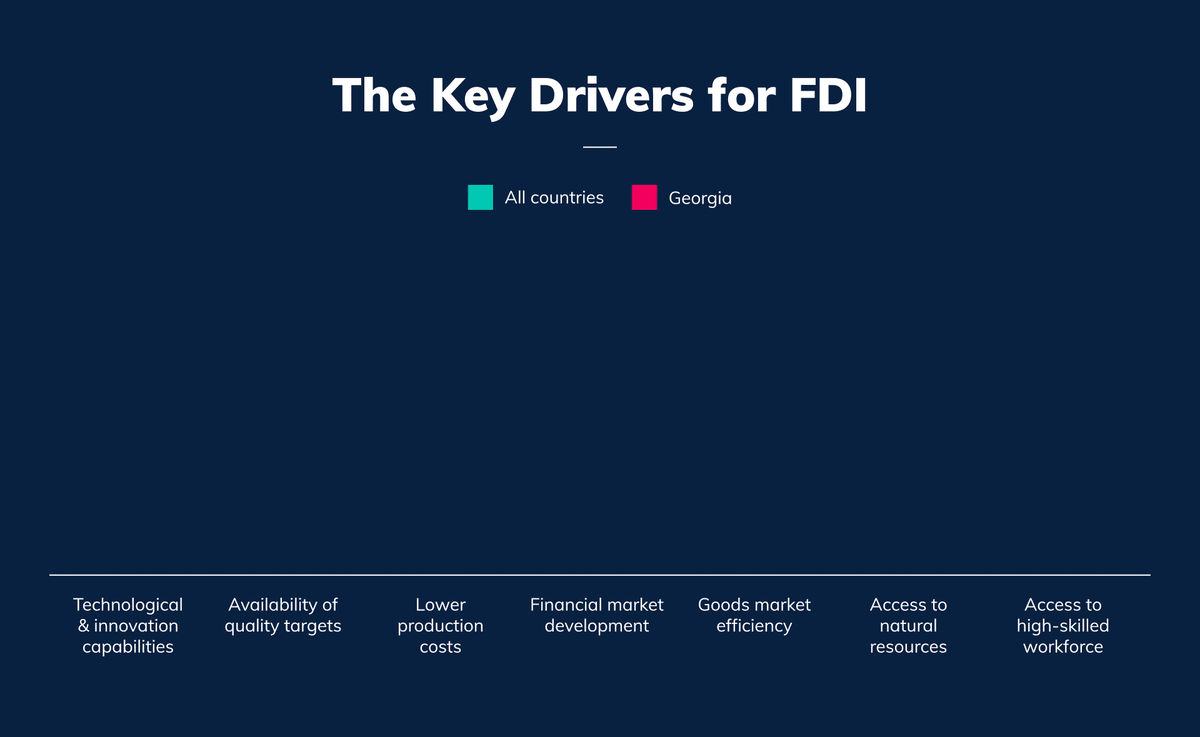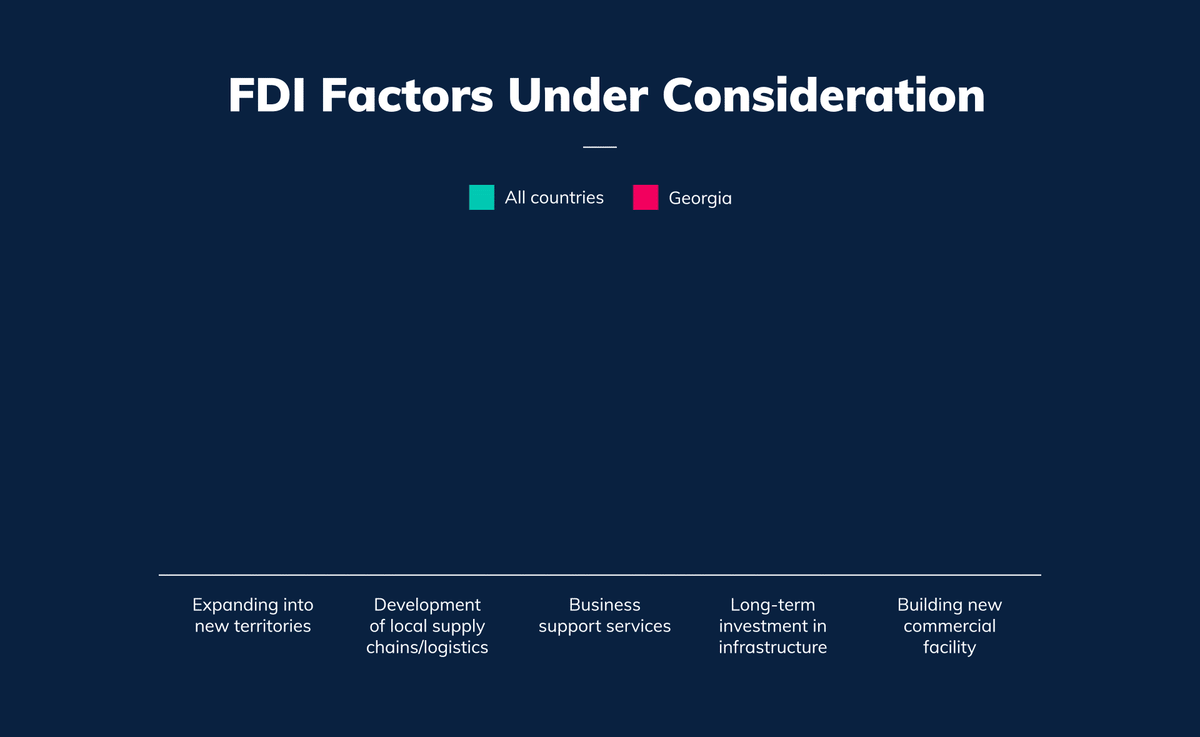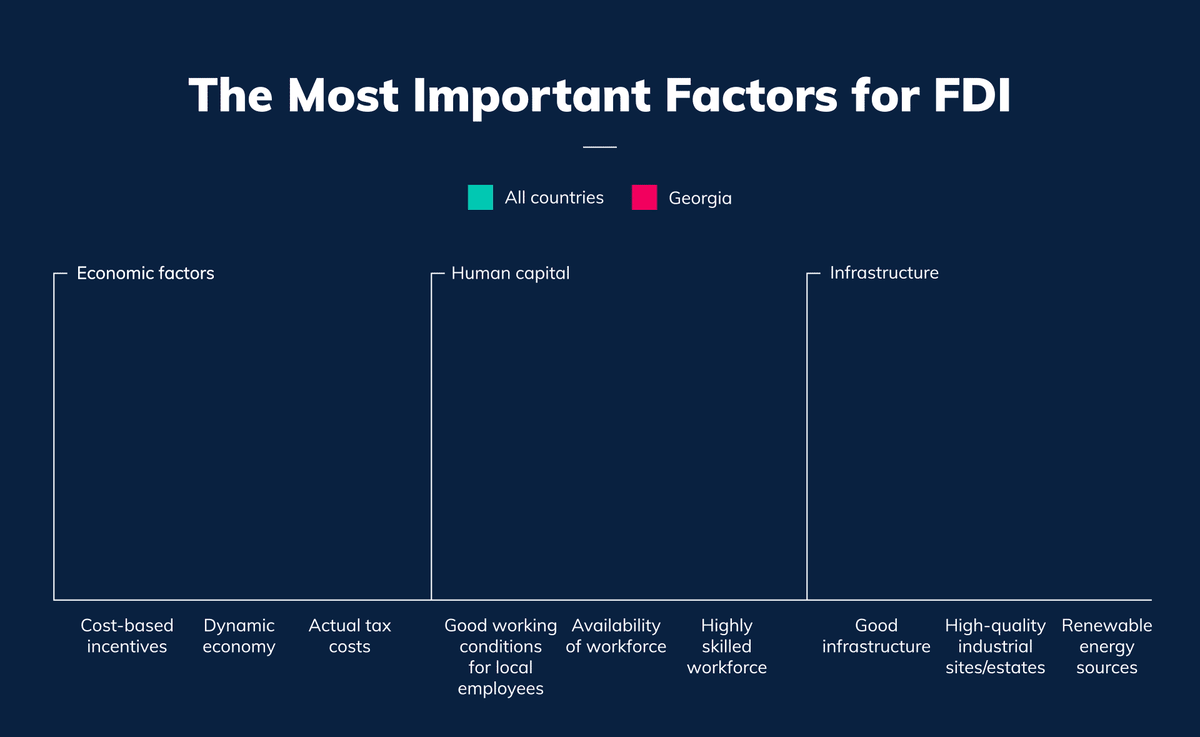
Georgia: The FDI Perspective
Georgia is enjoying soaring levels of foreign direct investment due to its emergence as a crucial Eurasian hub with a growing international reputation for ease of doing business.
Despite an uncertain global economic picture, investors have embraced reforms and opportunities in Georgia, which received a record $2 billion in FDI in 2022, a 61% increase over 2021. Georgia’s financial and insurance service companies were the biggest beneficiaries, receiving $526.4 million. There is also large-scale support for the country’s hospitality and energy industries, and for its rapidly expanding information and communications sector, which has seen its FDI grow exponentially, reaching $141 million in 2022.
The growing status of Georgia’s tech ecosystem is clear in Bloomberg Media’s latest FDI survey of more than 3,000 international investors. The 2023 study shows that 30% of investors considering Georgia for FDI in the next 1–3 years cited the country’s “technological and innovation capabilities” as a key driver in their decision-making. This figure has nearly doubled year-over-year, increasing from 16% in 2022.

The rise of Georgia’s tech investments
The Bloomberg study found that potential for technological development topped the wish list for FDI investors, who identified “accelerated digital transformation,” the “rapid rise of e-commerce” and “digital economy agreements” as the greatest opportunities for economic growth. Georgia’s advancement as a regional tech hub has placed it in a strong position, and FDI of $42.3 million flowed into its information and communications sector in the first quarter of 2023, an increase of 143.1% year-over-year.
International interest in Georgia’s startup ecosystem is growing. In May 2021, US vehicle dealership software provider SpinCar (now Impel) acquired Pulsar AI, an artificial intelligence company based in Georgia’s capital, Tbilisi, with an office in San Francisco. Pulsar AI had previously attracted investment from major venture capitalists, including California-based Ridge Ventures and Great Oaks VC in New York.
Pulsar AI was Georgia’s first startup to achieve a global exit, but shortly afterwards, Sweeft Digital, another Georgian startup, was bought by Making Science, a global tech marketing consultancy based in Spain. An e-commerce payment platform and app development company founded in Tbilisi in 2017, Sweeft Digital developed its proprietary Sweeft Wallet digital product and has acquired customer bases in the UK, Italy and Germany, and has further expanded across Europe, the US and Latin America.
Georgia’s technologists have put themselves on display for international investment. At Web Summit 2022 in Lisbon, one of the world’s largest technology events, the Georgian AI company Theneo beat out competition from 2,300 startups to win the prestigious PITCH final, sponsored by Siemens.
“I feel like it’s beyond just me or my company, it also represents a lot for my country,” said Theneo founder and CEO Ana Robakidze, upon accepting the prize. “Not a lot of people know about the startup ecosystem in Georgia—there are so many great startups, and I feel like I’m also representing them.”
The tech startup ecosystem is being supported by Georgia’s government. The Georgia Innovation and Technology Agency (GITA) has invested $12 million in over 200 startups since 2018, creating 3,000 jobs and attracting $175 million in private investment. In November, the New York-based global software consultancy Lineate opened offices in Georgia, making an investment of $700,000 and creating 60 jobs.

The FDI advantage
Bloomberg’s 2023 FDI study identifies various sectors that are attracting those interested in investing in Georgia in the next 1–3 years. The country’s low production costs and market efficiency continue to boost FDI, and for the past two years Georgia has posted double-digit GDP growth.
There is also high interest among FDI investors in the access that Georgia offers to growing consumer markets. Situated in the South Caucasus, Georgia is an increasingly important trade gateway between Europe and Asia, with access to a market of 2.3 billion people, thanks to a set of free-trade agreements that include FTAs with the EU and China.
Between 2021 and 2022, FDI in Georgia from the EU increased 142.5%.
FDI investors, the Bloomberg study found, are also drawn to the system of tax relief offered by Georgia’s government. Companies are almost entirely exempt from customs duties and are charged a 15% corporation tax rate only on distributed profit (undistributed profits are untaxed). Georgia encourages investment into its information and communications technology (ICT) sector, and has created a Virtual Zone that allows companies to benefit from low bureaucracy and a business-friendly legal system, while paying no corporate tax or VAT. Georgian laws grant International Company Status to overseas technology companies, offering exemptions on property tax and dividends tax, and a reduced 5% tax rate on profits and personal income.


The UK was Georgia’s leading foreign direct investor in 2022, committing $428 million. The UK government reports increased trade with Georgia during this period, with imports and exports worth $528 million, up 134.9% year-over-year. Other major sources of FDI into Georgia in 2022 were Spain ($367 million) and the US ($164 million, 10 times the amount in 2021).
The confidence of FDI investors in Georgia’s economy is shown in the amount of equity capital invested in 2022—$686.3 million, or 34.3% of total FDI—3.3 times higher than the adjusted figure for the previous year. Reinvestment was 1.7 times higher than in 2021, at $1.28 billion (64% of total FDI).
Highlighting Georgia’s increasingly strong trade ties with Europe, Georgia’s Minister of Economy, Levan Davitashvili, recently observed that almost half of the FDI received by Georgia in 2022 came from EU countries, which collectively increased their investment by 142.5% over 2021, and that FDI investment last year was at a “historic high.” Georgia’s impressive FDI indicators suggest that future investment could soon grow even higher.
